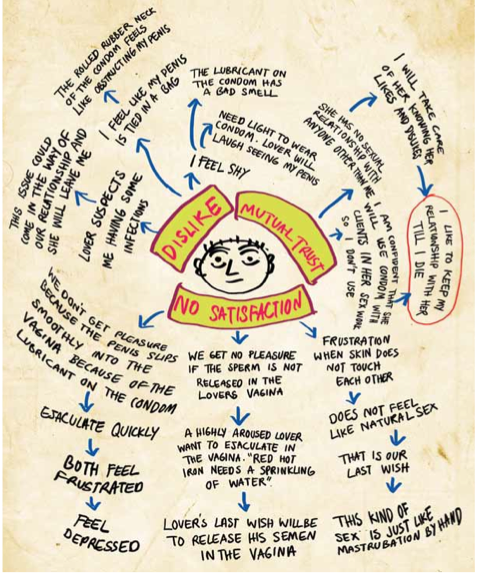Violence and a lack of condom use increase sex workers’ risk of HIV infection. But how can we design appropriate interventions if we do not understand the nature and dynamics of sex workers’ relationship with their intimate partners (IPs)? This study by STRIVE partner Karnataka Health Promotion Trust (KHPT) was conducted in Bagalkot District in 2012 in order fill this gap.
Researchers conducted a series of participatory workshops with sex workers and their intimate partners to explore:
- how they understand and interpret their relationships
- reasons for not using condoms in these relationships
- the role of violence and its consequences
Tools
To help participants share intimate experiences in a non-threatening way, the tools included:
- My Symbol
- Ideal Images
- Venn Diagram (Chapati Diagram)
- Octopus exercise
- Problem Tree
- Secret Ballot
- Hopes and Fears
These tools helped participants to depict:
- their perception of self and the partner including importance of various relationships in their lives
- ideal images of relationships
- factors influencing condom use in relationships
- violence and conflict in relationships
- hope and fears for the future
Participatory methods
Two separate three-day residential workshops were held: one for sex workers and one for their IPs. Participatory approaches, such as “Exploring Tools” and “Analysing Tools”, gave participants the option of talking about “the community” or “people like us”, enabling them to discuss issues in a non-traumatising or stigmatising manner, without having to relate their own experiences directly. “Exploring Tools” included Symbols and Venn Diagrams for observation and reflection of experiences, while “Analysing Tools” included the Octopus diagram and Problem Tree to identify linkages and perceptions and to explore relationships. A total of 68 respondents participated, including 31 female sex workers and 37 IPs of these sex workers. The list was generated with the help of community collectives of sex workers.

Why we don't use condoms
Findings
Female sex workers:
- consider their IPs an integral part of their lives
- tolerate violence in these relationships because of their dependency on the IPs and fear of the consequences of conflict
- fear that insisting on condom use causes suspicion about loyalty and fidelity, as well as a risk of separation, estrangement and/or violence from IPs
Their intimate partners:
- consider their families first
- expect both their female sex worker lovers and their wives to treat them as ‘god’ (as one respondent put it), for the women to be available whenever they need them, and to accept their supremacy and dominance in the relationship
- use violence as a means to demonstrate their power and to keep the female sex workers in constant submission
Programmes for prevention of HIV among female sex workers need to include interventions with their intimate partners in order to increase condom use and reduce violence. Both the female sex workers and their intimate partners value their relationships despite the high degree of violence and high risk posed by low use of condoms. Interventions must be designed with an awareness of the complex nature of these intimate partner relationships.
Learning from this study has helped in the design of the Samvedana Plus intervention.



